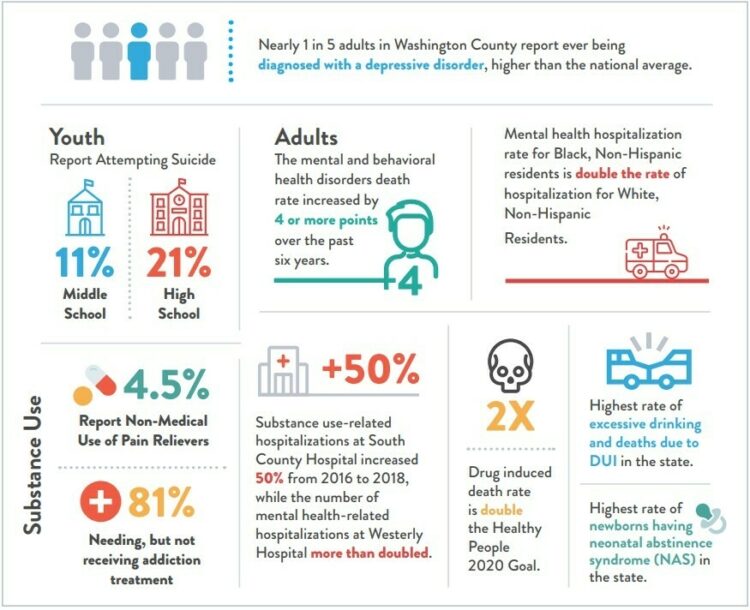Programs & Services
Our Behavioral Health work group uses a community-driven, collaborative approach to address mental health needs in Washington County. By working alongside residents and local organizations, we aim to build solutions and systems that ensure access to evidence-based services and supports. Our shared goal is to reduce barriers to mental health services, promote well-being, and create lasting, positive change in our communities.
Why Behavioral Health?
Mental health affects every aspect of our lives. It deeply affects our relationships, our ability to work, and our physical health. In Washington County, like much of Rhode Island and the nation, many people face significant mental health challenges and are struggling to get the help they need.
Washington County is designated as a Health Professional Shortage Area (HPSA) for mental health, meaning there simply aren’t enough providers to meet the demand. As a result, many residents, both children and adults, face long wait times, high costs, or a complete lack of services. Only one-third of children in our region receive the mental health evaluations they need, and without access to support, our children, friends, and neighbors continue to flood local emergency rooms in crisis in increasing numbers.
The Data

These numbers reflect more than just statistics. They reflect a growing crisis and the real, urgent need for our neighbors, friends, and families, but they also guide our efforts to create a more supportive, responsive behavioral health system for all.
Our Action Plan
HBHM leads a multi-year, county-wide strategic effort to transform behavioral health services and build a system that ensures everyone in Washington County has access to the care and support they deserve.
Our initiatives are guided by a 3-Year Action Plan designed with input from individuals with lived experience in our community, ensuring our work remains grounded in community needs and supports a recovery-oriented continuum of care.
The Plan in Action
Through these four pillars, we have been making strides toward creating a healthier, more resilient community. By working closely with residents, healthcare providers, and local organizations, HBHM is transforming the way behavioral health is addressed in Washington County.
View our 2024 Impact Summary for a detailed report of highlights from this past year including:
- Community-Based Mental Health Initiatives: Partnering with local organizations to offer evidence-based programs like Mental Health First Aid and Man Therapy, equipping residents with the tools they need to support mental well-being and tackle mental health challenges head-on.
- In response to its 20% increase in suicide rates from 2013 to 2015 and having the highest suicide rates in Rhode Island, Washington County began a county-wide, comprehensive prevention approach, including Washington County HEZ’s Mental Health First Aid Training Series. Washington County HEZ has delivered this training series to more than 1,000 police officers, clergy, teachers, parents, and staff of youth-serving organizations.
- Suicide Prevention and Crisis Intervention: Expanding the Zero Suicide initiative and supporting law enforcement with Crisis Intervention Training (CIT) to provide timely care instead of criminalizing mental health.
- Washington County HEZ has received federal funding to partner with local hospitals, community health centers, and residents to screen all patients for depression and provide high-quality, timely, and evidence-based care to patients at risk for suicide. In 2023, this patient screening effort, Zero Suicide, supported 125,000 patient screenings for depression and suicidal ideation.
- Implementing the Crisis Intervention Team (CIT) training for law enforcement officers has resulted in successfully diverting 529 individuals from arrest in 2019 alone. With 40% of calls to dispatch in Narragansett related to behavioral health crises and an average annual cost of $58,564 to incarcerate someone at the Adult Correctional Institutions (ACI), diverting individuals with behavioral health conditions from the criminal justice system to community-based mental health treatment significantly reduces costs. CIT has expanded statewide, a development that would only have occurred with the HEZ’s collaborative efforts.
- Expanding Access to Behavioral Healthcare: With Washington County facing a shortage of mental health providers, HBHM worked with community partners to improve access to care and reduce the strain on emergency departments. By embedding Community Health Workers (CHWs) in hospitals, we’ve helped connect patients to follow-up care and critical resources, leading to 44 fewer emergency visits for seven high-utilizing individuals, 649 interventions for 277 people, and investments in a behavioral health-friendly emergency response unit.
For a deeper look at our efforts and impact, explore our full reports and supporting documents:
- Full report
- Integrated Needs Assessment 3-4-20, the key backup information that feeds the plan
- System Gaps, Priority Areas, and Strategies: A two-chart file that shows 1) the gaps in the existing behavioral services system and 2) a proposed model that provides comprehensive preventive and responsive services
- Washington County Focus Group Report is a powerful group of consumers and families who speak about their personal experiences with Washington County’s mental health system.
- YouTube video announcing the initial project, with supportive material
